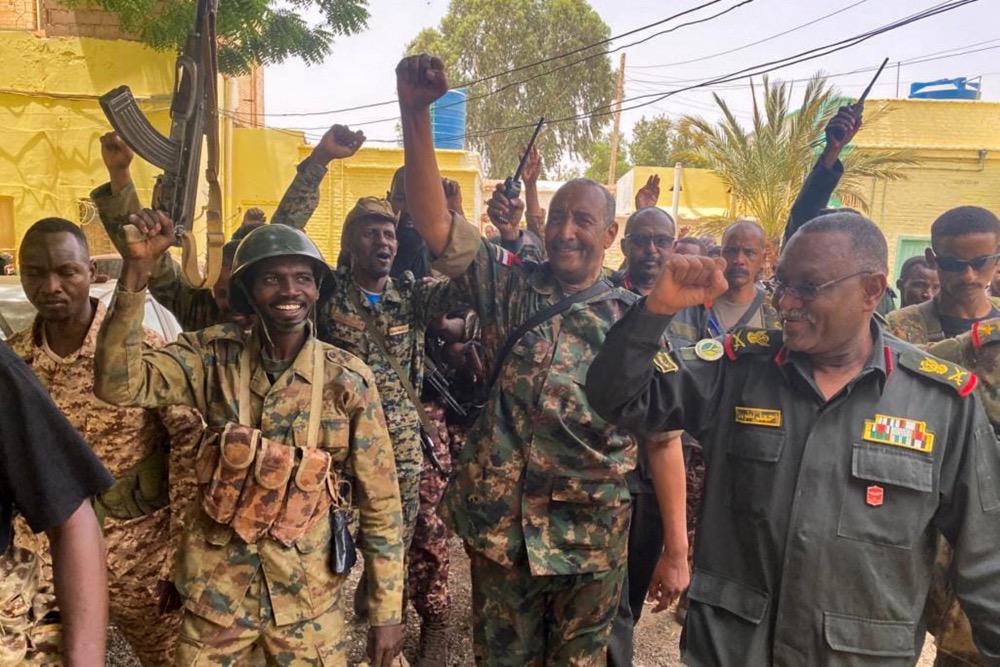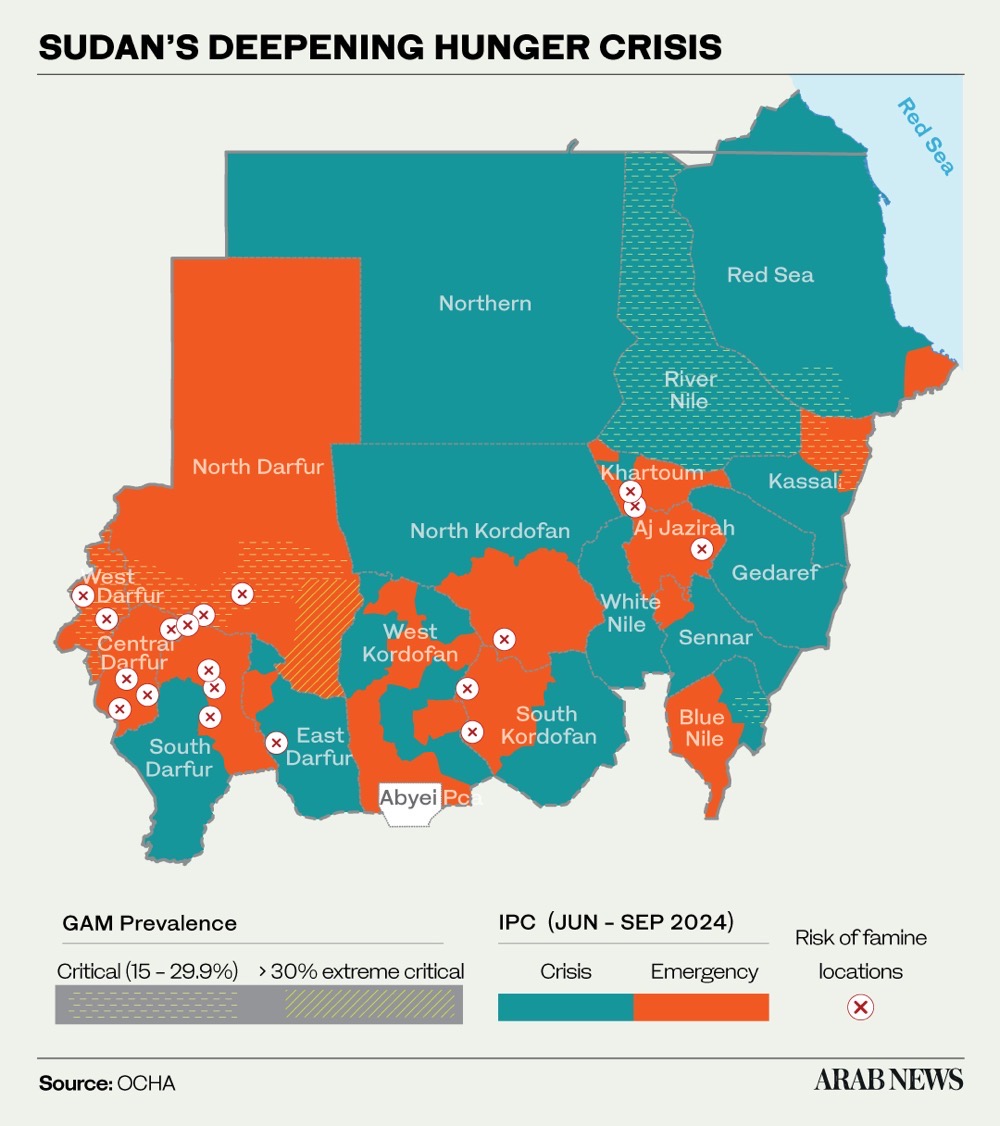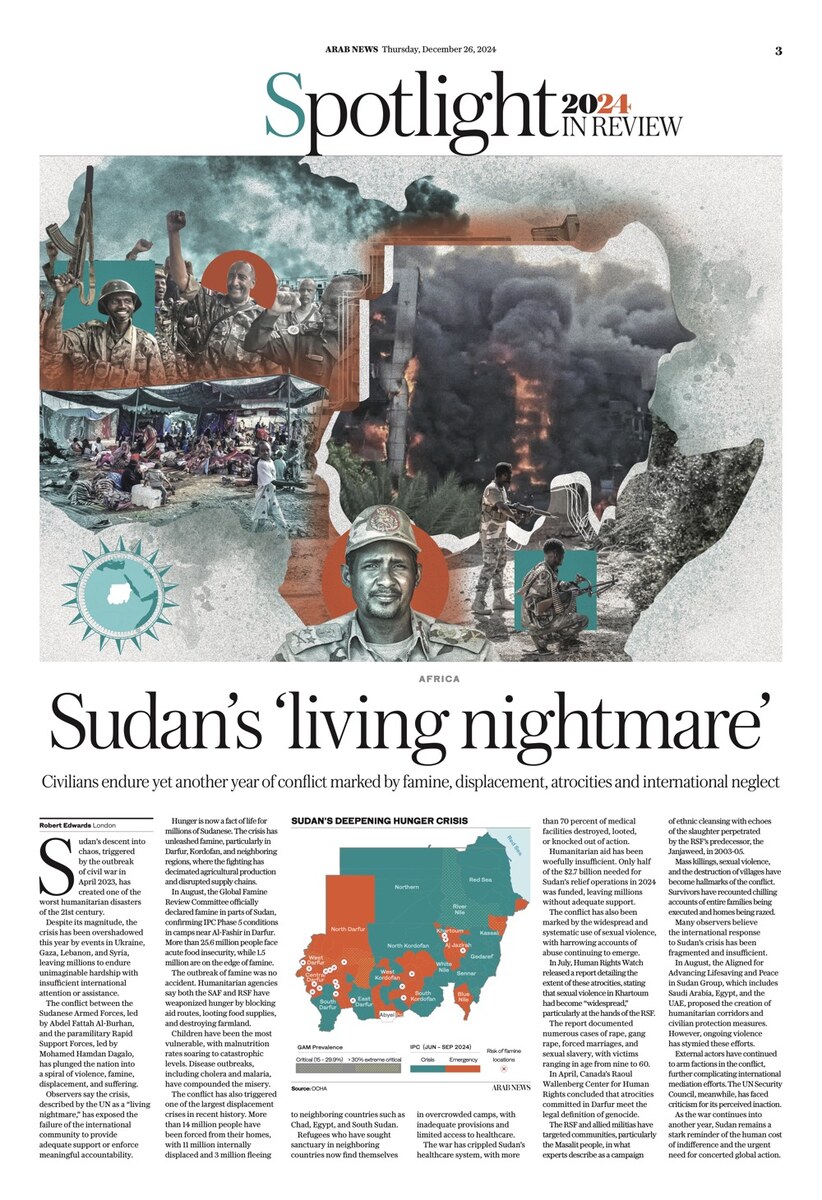LONDON: Sudan’s descent into chaos, triggered by the outbreak of civil war in April 2023, has created one of the worst humanitarian disasters of the 21st century.
Despite its magnitude, the crisis has been overshadowed this year by events in Ukraine, Gaza, Lebanon, and Syria, leaving millions to endure unimaginable hardship with insufficient international attention or assistance.
The conflict between the Sudanese Armed Forces, led by Abdel Fattah Al-Burhan, and the paramilitary Rapid Support Forces, led by Mohamed Hamdan Dagalo, has plunged the nation into a spiral of violence, famine, displacement, and suffering.
Over the course of 2024, tens of thousands of people have been killed and millions forced from their homes. Famine now blights swathes of the country, while mass atrocities have taken place in Darfur and other regions.
Essential services, including hospitals, have collapsed, leaving the population dependent on overstretched and underfunded humanitarian aid.

The conflict between Abdel Fattah Al-Burhan and Mohamed Hamdan Dagalo has plunged the nation into a spiral of violence. (AFP/File)
Observers say the crisis, described by the UN as a “living nightmare,” has exposed the failure of the international community to provide adequate support or enforce meaningful accountability.
Hunger is now a fact of life for millions of Sudanese. The crisis has unleashed famine, particularly in Darfur, Kordofan, and neighboring regions, where the fighting has decimated agricultural production and disrupted supply chains.
In August, the Global Famine Review Committee officially declared famine in parts of Sudan, confirming IPC Phase 5 conditions in camps near Al-Fashir in Darfur. More than 25.6 million people face acute food insecurity, while 1.5 million are on the edge of famine.
The outbreak of famine was no accident. Humanitarian agencies say both the SAF and RSF have weaponized hunger by blocking aid routes, looting food supplies, and destroying farmland.
The deliberate targeting of humanitarian convoys has left isolated communities without access to food or clean water, exacerbating the crisis. Children have been the most vulnerable, with malnutrition rates soaring to catastrophic levels in displacement camps.
Malnutrition weakens immune systems, making the population more susceptible to illness. Disease outbreaks, including cholera and malaria, have compounded the misery.
Relief efforts, hampered by funding gaps and logistical challenges, have failed to match the scale of need. Despite repeated warnings from aid organizations, donor pledges have fallen short, leaving millions at risk of starvation.

The conflict has also triggered one of the largest displacement crises in recent history. More than 14 million people have been forced from their homes, with 11 million internally displaced and 3 million fleeing to neighboring countries such as Chad, Egypt, and South Sudan.
Khartoum, once the vibrant capital of Sudan, has become an epicenter of displacement. Entire neighborhoods lie in ruins, and millions of internally displaced persons now live in makeshift shelters, enduring appalling conditions.
Refugees who have sought sanctuary in neighboring countries now find themselves in overcrowded camps, with inadequate provisions and limited access to healthcare.
Host countries, already grappling with their own economic and security challenges, have received insufficient international support to meet the growing needs of these vulnerable populations.
The plight of IDPs is compounded by continued violence. Armed groups frequently attack camps, looting supplies and preying on displaced families. Meanwhile, humanitarian organizations face immense challenges in reaching those most in need.
Millions of people lack access to basic necessities such as food, water, medicine, and fuel. The war has crippled the country’s healthcare system, with more than 70 percent of medical facilities destroyed, looted, or knocked out of action.
Humanitarian aid, though vital, has been woefully insufficient. Only half of the $2.7 billion needed for Sudan’s relief operations in 2024 was funded, leaving millions without adequate support.

Refugees who have sought sanctuary in neighboring countries now find themselves in overcrowded camps. (AFP/File)
Aid agencies say the SAF and RSF have systematically obstructed deliveries of relief, targeting warehouses and convoys in an attempt to starve opposition strongholds into submission. As such, despite the efforts of aid workers, the scale of suffering continues to grow.
The toll of Sudan’s civil war is staggering, with estimates indicating more than 150,000 civilians killed since the conflict began in April 2023. These deaths, caused by bombardments, massacres, starvation, and disease, underscore the catastrophic human cost of the war.
A November report by the London School of Hygiene & Tropical Medicine estimated more than 61,000 deaths in Khartoum state alone between April 2023 and June 2024.
Medical professionals warned early on that official figures underrepresented the true death toll, as many victims could not access hospitals due to ongoing violence.
In a May US Senate hearing, experts suggested the real casualty figure could be 10 to 15 times higher than earlier estimates.
The appalling extent of the violence plaguing Sudan emerged in October and November amid a spate of massacres in eastern Al-Jazirah state. As of December, up to 7,000 civilians had been killed in a series of brutal attacks reportedly carried out by the RSF, according to local monitors.
Survivors recounted harrowing tales of mass rape, forced displacements, and homes set ablaze. These atrocities are part of a broader pattern of violence that has characterized the conflict across Sudan.
Ethnic and territorial motives have driven these attacks, particularly in non-Arab communities. The RSF has been accused of systematic killings, sexual violence, and the destruction of entire villages in Darfur and other regions.
International condemnation of the massacres has been swift but largely ineffective. Human rights organizations have called for accountability and protection for civilians, but the lack of a functional justice system in Sudan has allowed perpetrators to act with impunity.
The conflict has also been marked by the widespread and systematic use of sexual violence, with harrowing accounts of abuse continuing to emerge.

Over the course of 2024, tens of thousands of people have been killed and millions forced from their homes. (AFP/File)
In July, Human Rights Watch released a report detailing the extent of these atrocities, stating that sexual violence in Khartoum had become “widespread,” particularly at the hands of the RSF.
The report documented numerous cases of rape, gang rape, forced marriages, and sexual slavery, with victims ranging in age from nine to 60.
Women and girls, often displaced and vulnerable, have been subjected to unimaginable suffering. NGOs estimate that as many as 4,400 cases of sexual assault may have occurred during the conflict, though the true number is likely much higher.
In April, Canada’s Raoul Wallenberg Center for Human Rights concluded that atrocities committed in Darfur meet the legal definition of genocide.
The RSF and allied militias have targeted communities, particularly the Masalit people, in what experts describe as a campaign of ethnic cleansing with echoes of the slaughter perpetrated by the RSF’s predecessor, the Janjaweed, in 2003-05.
Mass killings, sexual violence, and the destruction of villages have become hallmarks of the conflict. Survivors have recounted chilling accounts of entire families being executed and homes being razed.
The international community has struggled to respond effectively. While some advocacy groups have called for stronger sanctions and international prosecutions, enforcement mechanisms remain weak.
Many observers believe the international response to Sudan’s crisis has been fragmented and insufficient.

Relief efforts, hampered by funding gaps and logistical challenges, have failed to match the scale of need. (AFP/File)
The EU imposed sanctions on individuals and entities linked to activities that undermine Sudan’s stability, including those implicated in atrocities. However, these measures have done little to change the behavior of the warring factions.
The US and the African Union have called for a ceasefire, while Saudi Arabia and others have sought to mediate between the parties. However, peace talks have repeatedly failed.
In August, the Aligned for Advancing Lifesaving and Peace in Sudan (ALPS) Group, which includes Saudi Arabia, Egypt, and the UAE, proposed the creation of humanitarian corridors and civilian protection measures. However, ongoing violence has stymied these efforts.
External actors have continued to arm factions in the conflict, further complicating international mediation efforts. The UN Security Council, meanwhile, has faced criticism for its perceived inaction.
As the war continues into another year, Sudan remains a stark reminder of the human cost of indifference and the urgent need for concerted global action.

























